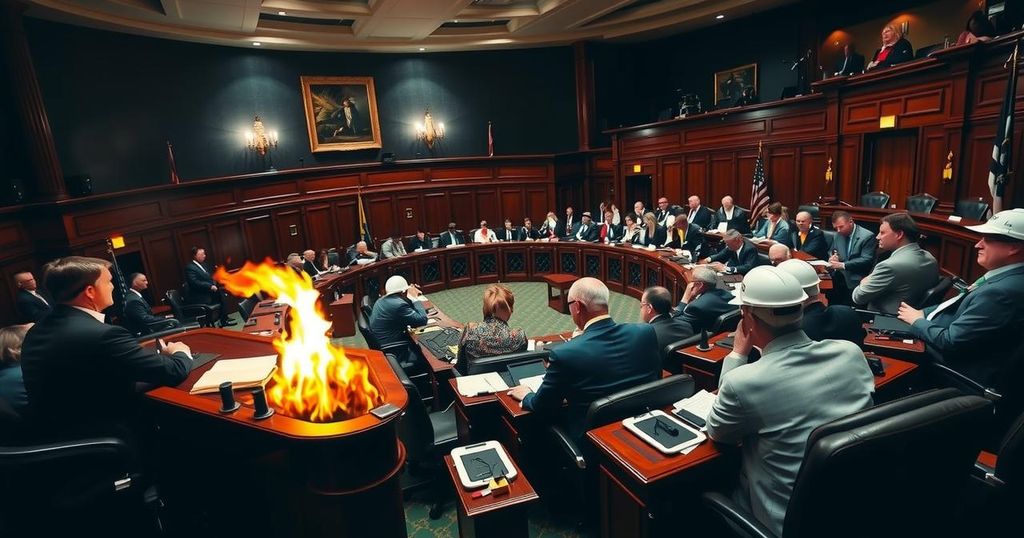The House of Representatives has passed the Anti-Gas Flaring Bill, aimed at prohibiting gas flaring except under controlled conditions. Sponsored by Hon. Babajimi Benson, the bill implements strict regulations to encourage gas resource utilization for economic growth. It includes enforcement frameworks, penalties for violations, community compensation, and aligns practices with international environmental commitments, promising significant benefits for Nigeria’s sustainability and economy.
The House of Representatives has successfully advanced the Anti-Gas Flaring (Prohibition and Enforcement) Bill, designed to strictly regulate and prohibit the flaring and venting of natural gas, except under controlled conditions. Sponsored by Hon. Babajimi Benson, the legislation aims to encourage the responsible use of gas resources to promote economic development and energy production. During the debate on the bill at the plenary session, Benson detailed the strong enforcement framework it establishes, which includes monitoring and penalties to ensure adherence to the law.
Benson emphasized that the law addresses the numerous environmental, health, and economic challenges posed by gas flaring, aligning Nigeria’s fossil fuel practices with international climate change commitments. He highlighted the detrimental effects of flaring on the environment, noting its significant contributions to greenhouse gas emissions and public health issues, such as respiratory diseases among local communities. Moreover, the waste of valuable gas that could support energy generation and export markets is a key concern that this bill seeks to rectify.
The proposed legislation advocates for a general prohibition on gas flaring, apart from emergencies or specific approvals by the Nigerian Upstream Petroleum Regulatory Commission (NUPRC). Operators are mandated to prepare and implement Gas Utilisation Plans, which detail strategies for capturing, processing, or commercializing the gas that would otherwise be flared. The bill stipulates stringent penalties for non-compliance, including fines of $5 for every 1,000 standard cubic feet flared and possible operational suspensions for repeated offenses.
Additionally, it establishes a framework for compensating communities affected by gas flaring and mandates environmental restoration, thereby offering a means of redress. The bill incorporates provisions for transparency and accountability, requiring operators to furnish the NUPRC with regular reports on flaring incidents, which will be audited and accessible to the public. Benson underscored that this approach fosters community trust and promotes compliance.
By showcasing the expected advantages of this legislation, Benson asserted that its successful implementation will contribute to environmental sustainability by curtailing carbon emissions, align with Nigeria’s climate objectives, and unlock natural gas resources. This, in turn, would facilitate electricity generation, bolster industrialization, and generate employment opportunities. The NUPRC will oversee the bill’s implementation, supported by relevant ministries and agencies to monitor its environmental impacts and ensure successful remediation practices.
The issue of gas flaring in Nigeria has long been a source of environmental degradation and public health crises. Flaring not only wastes natural resources but also contributes to considerable greenhouse gas emissions and public health issues such as respiratory and cardiovascular diseases. The new legislation introduced by Hon. Babajimi Benson seeks to dismantle this practice, aligning national policies with international environmental standards and promoting economic growth through the responsible use of gas resources. Such efforts are critical for meeting global climate change commitments while addressing local community health impacts and resource management.
In conclusion, the passing of the Anti-Gas Flaring Bill represents a significant step towards mitigating the harmful effects of gas flaring on the environment and public health in Nigeria. Through stringent regulations, transparency measures, and community compensation, the legislation aims to align the country’s gas practices with international standards, unlock economic potential, and promote sustainability. The bill sets forth a pathway for responsible gas usage, fostering a future where natural resources contribute positively to Nigeria’s economic landscape while safeguarding community well-being and the environment.
Original Source: www.arise.tv






